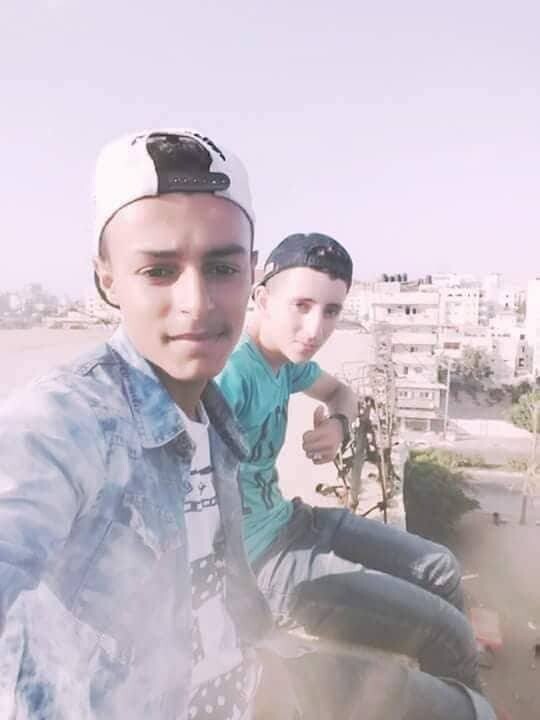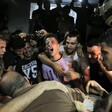The Electronic Intifada 3 August 2018

Palestinian children protest the killing of Louay Kuhail and Amir al-Nimra in front of the al-Katiba building in Gaza City on 15 July.
APA imagesIt rarely happened, but when it did, it proved a fateful decision.
On 14 July, Said Naji, 15, unusually declined to accompany his two friends, Louay Kuhail, 14, and Amir al-Nimra, 14, to hang out at popular makeshift park in the al-Katiba neighborhood in the center of Gaza City to eat lunch and attend an event at the adjacent Arts and Crafts Village, a local exhibition center that also runs educational courses.
“When the holiday started, we would go to the park almost every day to play football and take selfies from the top of the building,” Said told The Electronic Intifada. “When Louay and Amir went this time I didn’t have enough money, so I lied to them and said my dad needed me at home.”
The three boys were friends from the Imam al-Shafei Elementary Boys School as well as neighbors in the Sabra neighborhood in southern Gaza City. They shared everything, even agreeing to wear the same color clothes on some days. The boys also started a football team in their area with six players, led by Louay who used to play with the Gaza Sports Club.
The friends spoke shortly before Louay and Amir went to the park. It was almost exactly four years to the day since Israel had launched an all-out attack on Gaza in 2014. And an echo of those desperate days would soon arrive.
At around 5:30 pm, five Israeli missiles slammed into the abandoned multi-story al-Katiba building – once envisioned as holding the national library – in whose yard, children and families had created a makeshift park, especially for those hot days when Gaza’s homes are rarely cooled by the sporadic and unreliable electricity supply resulting from Israel’s siege of the coastal enclave.
The missiles came as part of the biggest Israeli aggression inside Gaza since 2014. It is the first time since that 2014 offensive that Israel has attacked targets in populated areas in the middle of Gaza.
The moment he heard of the bombardment, Said feared the worst. “When I heard that the bombardment was in the al-Katiba area, I ran quickly to Louay’s house to tell his parents that he was there. But when I got there, there were a lot of families there. In that moment, I realized that my friends had been killed.”
A place of horror

A selfie taken by Louay Kuhail, left, and Amir al-Nimra, shortly before they were killed in an Israeli strike on 14 July.
Al-Katiba is not far from this reporter’s house. And the scene in the immediate aftermath of the bombing was grim.
What was normally an area for leisure had turned into a place of horror. Broken toys were scattered everywhere, the trees had turned gray from the dust and debris, two cars had crashed into each other and there was broken glass wherever you stepped.
Women cried, sirens wailed, children screamed, providing the soundtrack to tragedy.
Mahmoud Abu Saada, 27, had been in the park with friends when the missiles struck. Though blood soaked the shirt he was carrying in his hand, he was not injured. He was the first to find the two dead boys.
“We didn’t know there had been anyone in the abandoned building. Then I saw little feet on the third floor and we ran up there. There were two children there, in a pool of blood, some sandwiches next to them. I took off my shirt to stop their bleeding until the paramedics came. Then I took my shirt and left.”
Just moments before the missiles struck, the boys had taken a selfie on top of the building. It has been widely shared since. When Said saw it, he recognized the location immediately.
“This is where we always went. We’d eat and look out over Gaza.”
The friends were inseparable and not just because of football (Said was the playmaker, Louay a striker and Amir a defender). They would memorize Quran verses together, follow the latest trends in fashion and all liked the Lebanese singer Wael Jassar. His friends were, said Said, the funniest in the neighborhood.
“They always made me laugh. I don’t know what to do without them.”
Killing the future
Amir and Louay were not the first child casualties in July. A day earlier, Uthman Hillis, 14, had been killed by an Israeli sniper when he tried to get close to the Gaza boundary as part of the still ongoing Great March of Return demonstrations.
The month has become notorious for child massacres. During Israel’s 2014 onslaught, July witnessed the infamous Bakr massacre, when four boys from the same family were slain while playing football on the beach.
On 28 July 2014, 10 children were killed in a missile strike on the Beach refugee camp and a 5-year-old succumbed to wounds he sustained in that attack two days later. It happened on the first day of the Eid al-Fitr holiday after Ramadan and became known as the Eid massacre.
Amir, whose name means “prince,” was a dutiful son who only wanted to play football. “I see him everywhere,” said Maysoon al-Nimra, 35, his mother. “I see him playing and laughing around me.”
His father, Muhammad, 42, who runs his own driving school, told The Electronic Intifada that he could always count on Amir. “He was my right hand at work. He spent a lot of time with me there. He was very young but he was a responsible person and I depended on him.”
Still, Muhammad added with a laugh: “Good as he was at work, when it came to Louay and football, he always chose them.”
Football was a huge part of the boys’ world. Louay’s uncle, Muhammad Saqer, 25, is himself a defender with Gaza Sports Club, and was instrumental in encouraging the boy’s talent.
“He came with me to the club from when he was 4. He memorized my training hours, and when he got older he joined the youth team.”
When he scored, he would imitate the celebration of Ronaldo, the Portuguese soccer star. It was his way, Saqer said, of showing off and having fun.
“Israel deprived Gaza of a future football star,” Louay’s uncle said. “He was a great defender.”
Maysoon, Amir’s mother, went further. “Israel is killing the future, killing our children.”
Hamza Abu Eltarabesh is a journalist from Gaza.





